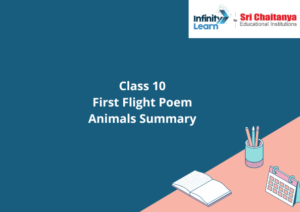Introduction to the Chapter:
In this poem, Walt Whitman draws a contrast between humans and animals. He has pointed out the evils that exist in the human brain that he believes animals don’t possess. That is why he believes that animals are superior to humans.
Summary of the Chapter:
The poet describes his desire to become an animal in the poem ‘Animals’, because he believes animals are far superior to humans. Humans are selfish and envious of one another. Animals, on the other hand, are tranquil and self-contained. The animals are content with their situation. They never express their dissatisfaction with their lot in life. Humans, on the other hand, lament their misfortunes. They place a higher value on the wealthy and powerful, become agitated by their wrongdoings, and seek solace in the world’s opulent goods. Animals, on the other hand, are open about their relationships and do not place a premium on a certain social class. They lead a life that is filled with honesty rather than greed and jealousy.

Stanza wise Explanation:
Stanza 1:
According to the poet, he wants to dwell in the world of animals. We can conclude that the poet prefers the world of animals than that of humans. He also claims that animals are more peaceful than people. He claims this because animals do not chase after worldly goods like humans do. They are tranquil and have no desire for material possessions or accomplishments. They are self-contained in the sense that they are content with their lives and do not meddle with the lives of others. Humans have a habit of meddling in other people’s lives. As a result, the poet believes that animals are superior to humans, in terms of remaining calm and not intervening in the affairs of others. The poet goes on to claim that it is for these reasons that he stands still and stares at the animals for so long.
Stanza 2:
Animals, unlike humans, do not grumble, according to the poet. They never weep out loud, as people do, to express their grief. They never cry out in the middle of the night, repenting for their wrongdoings. This indicates that animals differ from humans in that they do not express rage or anguish when something goes wrong with them. He goes on to argue that animals are very honest since they never brag about their good deeds done in God’s name. They make an effort to demonstrate their religiousness and good deeds to others. They do so in order to acquire favour with their peers. As a result, the poet believes that animals never anger him by acting in such a way to seek admiration from their peers. He believes that animals are not unsatisfied in the same way that humans are.They are content with what they have. They never get caught up in the whims of the world. They never endeavour to acquire things that are comfortable or luxurious. He claims that none of them are insane for acquiring material possessions.
Stanza 3:
The poet claims that he has never witnessed an animal bending down in front of a person as a sign of devotion. Even for their forefathers, they never do so. They do not display the same level of devotion to God as people do. No one among them has the same level of respect or importance as we do in human society. When compared to the poor, wealthier people are often given more prominence and treated with greater respect. They never do so in animal civilization, however. They never place a higher or lower value on any other species. Everyone in the animal kingdom is content. Creatures are also more honest in displaying their relationships with other animals, according to the poet. He’s trying to convey that animals eat other creatures and that they never try to hide it. Human individuals portray themselves as having pleasant and amicable interactions with others, despite the fact that the truth is quite different. The poet asserts that animals are truthful in expressing their relationships with other animals.
Finally, the poet examines himself and explains where the animals’ wonderful characteristics came from. He also wonders where his own positive characteristics have vanished. Did he abandon them or had they been misplaced inadvertently? Animals now possess attributes that were previously only seen in humans, such as innocence, benevolence, and truthfulness. He is perplexed as to why humans abandoned these traits, which have now been passed on to animals.
FAQs:
Ques: Name three things that people do that animals do not.
Answer: The following are three things that people do that animals do not:
Human’s lament and weep about their troubles and tragedies.
Humans lie awake at night contemplating their transgressions.
Humans also continue to tell others about their religious beliefs and responsibilities to God.
Ques: Do people who lived thousands of years ago bow down to other people?
Answer: Yes, humans used to kneel in front of other humans thousands of years ago. They were forefathers, priests, or speakers who they venerated religiously. They idolized them and listened to their sermons.


